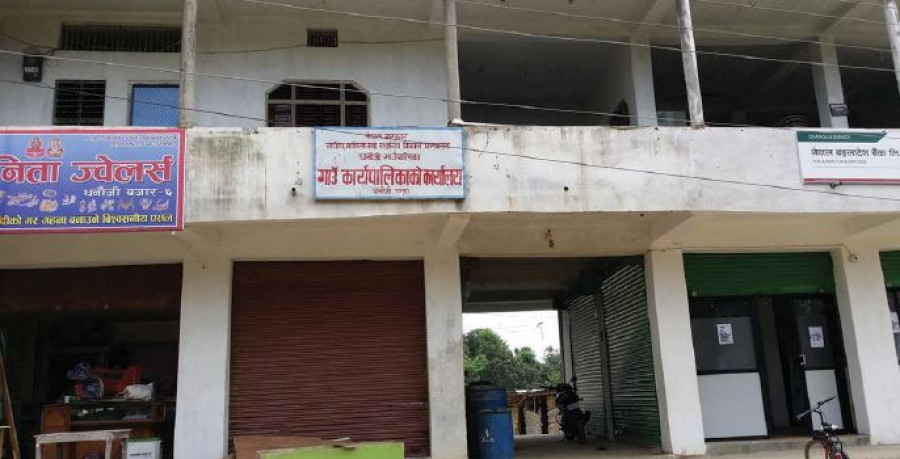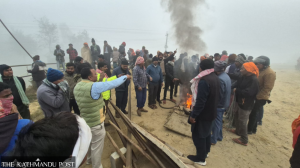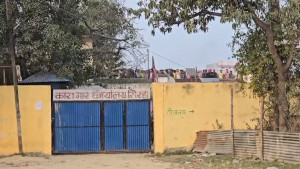Madhesh Province
Staffers in Dhanusha rural municipality hold sit-in demanding their pay
Local governments, including Dhanauji, haven’t been able to get their budget endorsed, months into new fiscal year.
Prithvi Man Shrestha
Staffers, teachers, health workers and other employees drawing their salary from Dhanauji Rural Municipality, Dhanusha, have been holding a sit-in outside the civic body’s office for the last 18 days demanding pay as officials haven’t disbursed their salary for six months.
With the rural municipality failing to convene the village assembly for a long time due to “political reasons”, the assembly could only meet on December 2 to approve the budget for the current fiscal year 2020-21.
At least three ward chairpersons have blamed chairperson Badri Narayan Singh and chief administrative officer Kanyaiya Kumar Mishra for the delay in paying the staff their salary. But, Misrha told the Post that he has been trying to get the budget released from the District Treasury Office.
Chairperson Singh, elected on a Nepali Congress ticket, does not have a majority in the village assembly. As Samajbadi Party, Nepal, and Nepal Communist Party hold a majority in the village assembly, their non-cooperation meant the assembly couldn’t convene on time and approve the budget.
According to Mishra, chairperson Singh has the backing of 13 village assembly members while other parties have 17 seats. “So, a political consensus could not be reached for holding the assembly,” said Mishra.
With delay in the presentation of the budget, the rural municipality failed to provide salary to the government staff. The local governments are responsible for distributing salary to federal government staffers, including teachers and health workers, using funds it receives in the form of conditional grants. Before distributing the salaries, the local governments need to incorporate the grants into their budget.
“The government staffers have padlocked the rural municipality office,” said Mishra, chief administrative officer at the rural municipality. “Even I haven’t received a penny in salary since the beginning of the fiscal year.”
“Vaccination programmes for children have also been halted,” Ram Mandal, chairperson of Ward No.1, told the Post. While Mishra attributed the tussle between the rural municipality chair and his opponents for the delay in payment of salaries, Mandal pointed his finger at the chairman and the chief administrative officer.
“It has been one and half months since the village assembly convened. But the chairperson and the chief administrative officer have done little to ensure that all government staffers are paid their salary,” said Mandal.
He accused Mishra of doing his own personal work at the district headquarter (Janakpur) for two months, instead of coming to the rural municipality regularly to run the office.
This was not the first time that Dhanauji failed to get its budget approved on time. During the last fiscal year too, officials presented their budget before the village assembly only in February 2020, eight months after the deadline to do so.
According to the Intergovernmental Fiscal Arrangements Act, local governments need to present their budget by June 25 every year. A number of the local governments are yet to present their budgets even seven months into the new fiscal year.
According to the Ministry of Federal Affairs and General Administration, as many as 14 local governments, most of them from Province 2 are yet to present their budget for the current fiscal year.
Ever since the local elections were held, a number of local governments have been failing to present their budget on time. But, there has been some improvement in the last three years.
“Due to the delay in budget presentation, development works have also been badly affected in our rural municipality,” said Mishra. “Without the budget being approved, it’s not possible to invite bids for development projects.”
A senior official at the federal affairs ministry told the Post on condition of anonymity that the presentation of local budgets has been delayed due to lack of consensus among elected representatives regarding the sharing of the budget for their own areas.
“Disputes have been arising in the local assembly in cases where members are from different political parties,” the official said. “Even when elected representatives are from the same party, they have been unable to reach a consensus on sharing of the budget.”
After observing that various local governments are not presenting their budget on time, the federal government has sought to amend the Local Level Operation Act.
The federal affairs ministry, which drafted the amendment proposal, has proposed that the local government not be allowed to spend a single penny without getting its budget approved by the assembly. “We have proposed that the local government that fails to present its budget, will get a budget from the centre, but they cannot run their account without getting the budget endorsed,” the official said.
Likewise, the federal and provincial governments shall also stop providing grants to local governments that fail to convene the assembly for two consecutive years, according to the proposal.




 13.12°C Kathmandu
13.12°C Kathmandu












